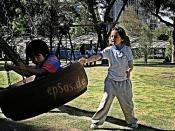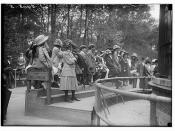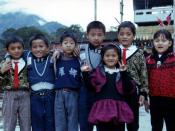As a person I have always been interested in promoting better social conditions in my community. I have a long history in Taiwan's volunteer sector of society, as I had the urge to do good instilled in me as a young child. I do not have the conscience that allows me to sit idly when there is suffering evident. Even as important as my career is to me, I am positive that I will always allot time for social work in my community.
My ethical dilemma took place while I was attending ABC University. I was the leader of a university outreach program to the aboriginal population of Taiwan. As ABC is situated close to a large portion of Taiwan's indigenous peoples, student volunteers to come in these aboriginal communities and tutor local children through this outreach program. It is a project which I enjoyed working for.
I really felt like we were there to make a difference in these aboriginals' lives. Difficulties began when the children's parents began to question our motives, for attempting to decimate their traditional culture and livelihoods. They threatened to pull their children out of educational programs and to bar our teachers from entering their camps and schools. Basically, our outreach program, in which I was the leader, was in jeopardy. I needed to re-evaluate my strategy with the aboriginals if I was to save my program.
To understand just how sensitive of an issue this is in Taiwan, maybe it is necessary to think of the case example of the American Indians. Taiwanese aboriginals have faced much the same struggle that Native Americans endured in North America. Their culture was nearly decimated by foreigners, first by the Spanish and then by the continuing emigration of Chinese from the Mainland. To this day they remain disenfranchised by the society at large. They have been cleared off most their traditional lands and stripped of their traditional ways of life. Their place in society is limited to remote and poor agricultural villages.
From their unfortunate history, I can understand their slight distrust for people outside their village. What reason have we really given the aboriginals to trust outsiders? We have taken their lands without any compensation. Who are we to enter their meager villages and tell them what kinds of models in life they should follow. Their necessities in life are different from the industrial and technologically advanced segments in society. They follow an older philosophy on life that reflects their modern living conditions. They still believe in having many children in the vain that these kids can help the family farm the land. Rarely do these children pass junior high school before their parents cannot afford to send them to school or need them to help economically. Unfortunately, this is a deadly cycle for the aboriginals. In modern day Taiwan, the only way a segment of society is going to gain social mobility is through higher learning.
Educational advancement in their communities was the precise goal of our outreach program. Only somewhere along the way communication became misconstrued and intentions questioned. In the aboriginal community there is an unfortunately a prevailing cynicism and lethargy. Some parents actually do not want their kids to seek an education because of this cynicism. What good is going to come to our community, they might ask. As I stated earlier, I understand this sentiment, only it needs to be thwarted at some point or another. Otherwise, there will never be a solution to this ongoing problem if this lethargy is not pierced.
Slowly, after parents began to boycott our efforts to tutor their children, I began to re-evaluate my outreach program's efforts. I looked for more creative and effective strategy to win the parents back over. Certainly, money was one large obstacle they faced in further educating their children. I began to probe local companies for intern sponsorships. These companies would pay for the children's tuition at vocational schools, allowing them to finish off their grade school and high school education. In return, the companies would receive workers for their factories, service jobs, offices, etc. on a part time basis. It was an attractive deal for everyone, especially for the aboriginal families. The children actually earned quite a bit of income on top of their school tuition costs. They could send this money back to their parents to help their families' efforts. Quite literally, it was a win-win situation for all components of this conflict.
I am proud of the manner in which I handled my ethical dilemma. The dilemma in this case involved the jeopardy my program was placed in as well as the children's well being. I displayed the strategic creativity and flexibility to stave off this disaster. Truly, I feel like I was able to good for these people in a way that I could earn their trust. Maybe I dabbled in a process that is kind of a starting point for bettering the social conditions of Taiwan's aboriginal population.





